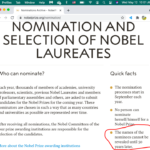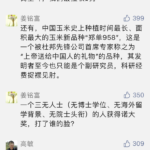 China or Chinese view Nobel Prize differently: they coveted it so much, they bragged about whom he or she had nominated (really? “The names of the nominees cannot be revealed until 50 years later.”) or sent delegation to Stockholm to lobby. There were many Chinese laureates but they won while on the foreign soil, most here in US. In 2015, Tu Youyou won half of the Physiology/Medicine prize “for her discoveries concerning a novel therapy against Malaria.”
China or Chinese view Nobel Prize differently: they coveted it so much, they bragged about whom he or she had nominated (really? “The names of the nominees cannot be revealed until 50 years later.”) or sent delegation to Stockholm to lobby. There were many Chinese laureates but they won while on the foreign soil, most here in US. In 2015, Tu Youyou won half of the Physiology/Medicine prize “for her discoveries concerning a novel therapy against Malaria.”
I would think China would be over the moon. One of their own had won, finally. But it wasn’t the case: 围剿屠呦呦 …
Slate: All China Wanted Was a Nobel Prize
So why is it so unexcited about the Chinese scientist who finally won one?
By Zhang Yan, OCT 23, 2015
For years, it had almost become a ritual among Chinese media outlets to wonder why the country never had a scientist win a prestigious Nobel Prize. Commentators would express dismay over how poorly China was represented among Nobel winners, and many held it as proof of the country’s inadequate scientific capabilities and of schools’ and research facilities’ failure to cultivate innovation.
Then this year, when the Nobel Committee finally knocked on China’s door, giving an award to medical scientist Tu Youyou for her role in anti-malarial drug research, debate of a different sort erupted. Questions were raised over whether she had played a role big enough to deserve the accolade; if she did, then why had she gotten so little recognition in China? Others wondered what was wrong with the way the country hands out awards, and whether Tu’s honor also belonged to traditional Chinese medicine.
The Nobel Assembly at Karolinska Institutet in Stockholm announced on Oct. 5 that Tu was among three scientists to share this year’s prize in medicine or physiology. The other two are William Campbell of the United States and Japanese Satoshi Omura, for their development of an anti-parasite treatment for river blindness.
Tu, who’s in her 80s, was awarded a Nobel Prize for her contribution to the discovery of “qinghaosu,” or artemisinin, “a drug that has significantly reduced the mortality rates for patients suffering from malaria,” the committee said. When used with other therapies, the drug can reduce mortality from malaria by more than one-fifth. As a result, more than 100,000 lives are saved each year in Africa alone, the body said.
As the first Chinese national to win a Nobel Prize in a scientific field, Tu said she understood the significance of the award. “Chinese people have wished to win Nobel Prize for long time, and this time artemisinin won the prize,” she said in a telephone interview with the Nobel Committee.
The official Xinhua News Agency applauded Tu for her “outstanding contribution to the discovery and research of artemisinin” and said the award is “recognition for China’s contribution to the world.”
The drug was discovered in 1967 as part of a project intended to fight malaria in the former North Vietnam and in southern China. Project 523—named after its starting date of May 23, 1967—involved more than 500 researchers from about 60 institutes around the country, including Tu, who was a research assistant then.
When a final report describing artemisinin’s structure, pharmacology, and efficacy appeared in 1979 under the name “Qinghaosu Anti-Malarial Coordinating Research Group,” it was hard to know who the key figure in the research was. Then, in 2011, two researchers at the U.S. National Institutes of Health, Louis Miller and Su Xinzhuan, looked into the history of artemisinin and named Tu as the drug’s discoverer.
However, in a book published in 2006, the former deputy director of the project, Zhang Jianfang, said the artemisinin success was a “collective honor” for everyone involved, and that limitations on talent, equipment, funding, knowledge, and skills meant no individual could have accomplished such a medical breakthrough on his or her own.
In a society where collectivism trumps individual roles, Xinhua compared the process of discovering artemisinin to a relay completed by many researchers. “Every ‘runner’ is important; no one can accomplish the goal solely,” it said.
However, Tu said in 2011 she played a decisive role in the research by using ether to extract active ingredients from Artemisia annua, or sweet wormwood, a plant native to Asian countries.
“Everyone is entitled to his opinion,” Tu responded to questions about the drug’s discovery in an interview with the New York Times. “We all believed in collectivism. All I wanted was to do good work at my job. Of course, I’d be nothing without my team. Foreign countries like the United States care a lot about which individual should claim credit. Foreigners read the historical records and picked me. Chinese awards are always given to teams, but foreign awards are different. This honor belongs to me, my team and the entire nation.”
After learning that Tu was awarded the Nobel Prize, Lu Bai, a professor at Tsinghua University’s School of Medicine, said Tu played a pivotal role in the research: “Although a lot of people participated in the project, she made the most important decisions and that’s also what the Nobel Committee cared about.”
The Nobel Committee said Tu was the first to show artemisinin was highly effective against the malaria parasite. “After all, discoveries are made by individuals and not by organizations,” Göran Hansson, secretary of the Nobel Committee for Physiology or Medicine, said on the committee’s website, apparently having anticipated questions about an individual’s role in scientific research.
“In a time when organizations and institutions become increasingly important and powerful, it is even more important to identify the creative individuals who change the world,” he said.
In 2011, Tu, a research fellow at the China Academy of Traditional Chinese Medicine in Beijing, won the Lasker Award, one of the biggest prizes in medicine. However, despite international recognition for her work, Tu has received little acclaim for her achievements in her home country.
She does not have a doctoral degree and is not a member of the prestigious Chinese Academy of Sciences, leading some to question the way its members are chosen. “From what Tu has experienced in China, we can see how the selection of academics has been flawed because it is carried away with non-academic issues,” Jin Dongyan, a biology professor at the University of Hong Kong, wrote on a blog.
The Chinese Academy of Sciences and the Chinese Academy of Engineering have been criticized for lacking transparency in how selections are made. Before 2014, intellectuals, military officers, and senior executives at state-owned enterprises could be nominated to a top academy, and the process was sometimes tainted by corruption. Zhang Shuguang, a disgraced former railroad engineer, admitted he once spent more than 20 million yuan ($3.2 million) trying to become a member of Chinese Academy of Sciences.
Tu’s Nobel Prize victory has rekindled the debate over how members of these top bodies are picked. “How to make research achievements the determining factor is the goal for future reform of China’s science and technology system,” Jin wrote.
Some in China have linked Tu’s award to Chinese medicine, even though the Nobel Committee never mentioned it. Her research did involve literature and recipes from traditional Chinese medicine. A large-scale screening of herbal remedies in malaria-infected animals eventually led her to an extract from the artemisia herb. However, the early results were inconsistent. Tu revisited ancient literature, finding clues that guided her to use ether to extract the active component in artemisinin.
None other than the Chinese premier, Li Keqiang, seized upon this as a victory for traditional Chinese medicine. “Tu Youyou’s winning of the Nobel Prize in Physiology or Medicine is an expression of the prosperity and progress of Chinese science, and of the huge contribution that Chinese traditional medicine and pharmacology have made to the health of humankind,” Li said in his message of congratulations.
However, the Nobel Committee emphasized in explaining why Tu won the award that it was not given to traditional Chinese medicine but to a scientist who used sophisticated research methods to find a new therapy for malaria.
The process of turning an active component in plants into a modern drug involves laboratory studies and tests on animals, which is significantly different from how the herb was used in traditional Chinese medicine, Wang Liming, a professor at Zhejiang University’s Life Sciences Institute, wrote in a commentary for Caixin.
But merely calling artemisinin a drug “inspired by traditional Chinese medicine” cannot satisfy the nation and people who have faith in the practice, he said.
 围剿屠呦呦 2021.5.08, 华尔街俱乐部
围剿屠呦呦 2021.5.08, 华尔街俱乐部
1.
2015年10月,屠呦呦获得诺贝尔生理学或医学奖。这是中国本土科学家获得的第一个诺贝尔科学奖项,当然也是中国科学界获得的史上最高荣誉,意义十分重大。
然而在屠呦呦获得诺奖的前后一段时间,一场或公开或隐蔽的围剿行动正在展开,目的只有一个:阻截屠呦呦获得诺奖。没获奖之前,希望她失败,获奖之后,他们也没有放弃努力,试图让诺奖评选委员会收回已经颁发的奖项。
这样一场反科学的闹剧,就是这样真实地发生过。
本来,屠呦呦获得诺奖,是中国科学界集体露脸的时刻,因为这代表中国的科研水平得到了国际认可。但许多科学界人士却无耻地露出屁股。
屠呦呦打败了最尖级的国际同行,但是她似乎永远也打不败“优秀”的国内同行和科学官僚。
2.
按照一篇现在网上已经找不到的公开纪实报道《屠呦呦获得诺奖之“谜”》,反对屠呦呦获得诺奖的第一个理由,来自一位在中国科学领域有着实权的人士,他公开表示说,
“这个奖不是我报的,也没有征求我的意见。我不赞成她一个人得奖,我赞成国家科委批准的发明单位都应该得奖”。
我们的很多领域,都是外行管理内行,业 余指导专业。话说外行怎么管理内行呢?就是在程序上设卡,卡得死死的。什么青蒿素咱不懂,打报告、审批、领导研究决定这些事,还不是玩得飞起?
这个奖不是我报的,也没有征求我的意见——你谁?我不赞成她一个人得奖,我赞成国家科委批准的发明单位都应该得奖——这是要把一个最高级别的国际奖项变成单位内部评你好我好的先进?
你以为他真的是在意程序公正和集体荣誉感吗?并不是。他在意的是“我”,没有我的慧眼识珠,没有我的参与,这个奖是不能算数的,哪怕你是诺贝尔。他是想分一杯羹,也在诺奖历史上留下自己的名字。他想的,不是集体而恰恰是个人主义。
这种公开表态,说明是一种主流观点,大家不以为耻,反以为荣。由此也可以推想,国内的许多奖项,是有多大的水分和官僚意志在作怪。
3.
平心而论,这种明枪还算是好的。更可怕的是暗箭伤人。在屠呦呦获奖之后,有不少科学界人士联名向诺奖评委会写信,要求取消这个奖项的评定。
我们现在不知道这些联名科学家是哪些人,报道也没有说,想必都是些地位尊崇的人物,说起来无疑会引发一场舆情地震。这种我得不到、你也不要得到的心态,很变态,但是置于某国环境,似乎又有一种深入骨髓的真实,这便是反对屠呦呦的第二个理由:
宁可不要这个诺奖,也不能让屠呦呦一个人独享。
这就好比,改革开放之后,甚至直到今天,一些人先富起来了,另一些人就开始无比怀念大家都穷的时代。经济上的悬殊,确实容易让人产生被剥夺感,但科学上的事也如此吗?你进步了,我就扯你的后腿,把你拉下来一起落后?
我不是说科学家就一定要淡泊名利,但是科学研究成果你的就是你的,不是你的就不是你的,这个强求不来,不必搞得你死我活、玉石俱焚。人性的自私、狭隘、丑陋与阴暗,在此暴露得彻彻底底,真是脸都不要了。
4.
需要说明的是,青蒿素的研究确实不是屠呦呦的功劳,但她是团队中的领军人物,作出了最关键的贡献,这是得到公认的。诺奖并不认可集体成就,而只奖励个人,因为“个体才能作出发现,而不是组织。在组织和机构变得愈发重要和有权力的时代,从中辩识出真正具有创造力并改变世界的个体也变得愈发重要”。
这才是诺贝尔奖具有国际公信力的真正原因。动不动就奖励集体,淡化个人,看上去很公平,但其实最不公平,因为最容易夹带私货,领导的个人意识变得格外重要。最后就演变成,所有人都得取悦权力,向权力献媚。喜欢讲集体主义,不过是虚伪和权力的最后一块遮羞布。
反对屠呦呦的第三个理由,更为可笑:屠呦呦在学术同行中声誉不高、名气不大。论资排辈、按名气分配荣誉的事,国内搞搞也就算了,毕竟大家都习惯,现在居然要闹到国际上,让外人看笑话,丑而不自知。
其实早在2011年,屠呦呦获得拉斯克奖之时,就有人提出过这种观点。他们愚蠢而执着地认为,名气就代表一切,所有奖项都该颁给名气最大的那个人。
这里有一个很大的悖论,科学家的名气和科研水平并不是正相关的关系,很多时候是相反的。科学家都要想有名气,就得经营关系,拉帮结派,相互吹捧。但要想做研究,又必须耐得住寂寞,远离这些名利。酒桌饭局上,可以谈成生意,但绝对无法诞生一项研究,除非是关于茅台的口感和风味的研究。
5.
看到这里,你应该知道一些人为什么对屠呦呦获诺奖咬牙切齿的原因:屠呦呦就像一个外来的闯入者,打破了他们的利益平衡,让他们感受到了威胁。
原本,吃吃喝喝、相互捧捧臭脚,就能轻松得到学术名气,现在屠呦呦绊脚石一样挡在那里,让他们觉得事情不好办。
原本,有了学术名气,评各种奖项就跟幼儿园排排座、分果果一样简单,现在有了一个诺奖得主,这事怎么弄?
原本,有了奖项,申请科研经费还不手到擒来,现在这个事情就比较尴尬了。
都特么怪屠呦呦。
所以他们根本不是嫉妒屠呦呦获得诺贝尔奖,反正他们永远也无法得到,他们是痛恨屠呦呦影响他们吃蛋糕。如果屠呦呦是美籍华人,或者随便一个外国人,他们一定会第一时间送上诚挚的祝福,科学无国界嘛,管你什么集体贡献还是个人贡献,管你什么名气大不大,因为跟我毛线关系。但是屠呦呦就在身边啊,如梗在喉如芒刺背如坐针毡。
这些人虽然最终没有如愿取消屠呦呦的诺贝尔奖,但我们不能说他们失败了。如你所见,屠呦呦虽然获得了诺贝尔奖,做到前无古人之事,为中国人争得了无上的光荣,但她并没有获得与之匹配的名气、荣誉和待遇。我们有烟草院士、在选的茅台院士,但屠呦呦至今未能当选中国科学院院士。这固然与屠呦呦低调的性格有关,但仍然让人感受到一种隐性的打压:国际上咱管不了,国内还管不了?我能让你获得诺奖就像没有获过一样。
这场围剿屠呦呦的暗战,已经过去6年时间,但空气仍然有硝烟的味道。这种人性扭曲下的丑陋,其实每天、每个角落都在上演。
Be First to Comment